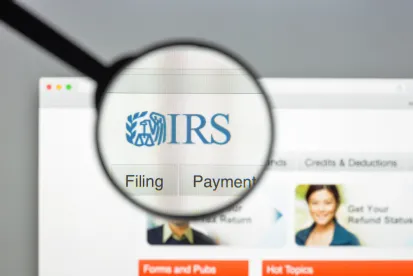The Internal Revenue Service (IRS) announced a new pilot for retirement plans that became effective in June 2022. The 90-Day Pre-Examination Compliance Pilot gives retirement plan sponsors, who have been notified by IRS letter that their plan has been selected for an examination, 90 days to review the plan document and operations to determine if the document and operations satisfy all tax law requirements. The IRS did not say how long the pilot program will last.
If the plan sponsor fails to respond to the IRS letter within 90 days, the IRS will proceed with scheduling the examination. Alternatively, if the plan sponsor conducts a compliance review and finds mistakes in the plan document or operation, the mistakes may be corrected by using the correction principles set forth under the IRS Employee Plans Compliance Resolution Program (EPCRS), either through self-correction or by requesting an IRS closing agreement. The amount of sanctions imposed on the plan sponsor under the closing agreement is limited to the application fee under the Voluntary Correction Program (VCP) contained in EPCRS, ranging from $1,500 - $3,500. There are no fees associated with self-correction (SCP), other than the expense of correcting mistakes.
Under EPCRS (SCP, VCP, and Audit CAP)
Under SCP a plan sponsor may correct mistakes at any time, even during an IRS examination, if the mistakes are considered “insignificant.” Some factors in determining if a mistake is “insignificant” are whether more than one mistake occurred during the same period, number of years the mistake occurred, percentage of plan assets/contributions involved, number of participants affected relative to total number of participants in the plan or number of participants who could have been affected, whether correction of the mistake was made within a reasonable time after discovery, and the reason the failure occurred.
If mistakes are significant and therefore cannot be corrected under SCP, the plan sponsor may still correct mistakes by filing an application under VCP, paying the application fee indicated above, making additional corrections the IRS may require, and obtaining a closing agreement. However, a VCP application can no longer be filed once the plan sponsor receives notice from the IRS of a plan examination.
Prior to the start of this new 90-Day Pre-Examination Pilot, if the plan sponsor received an examination notice from the IRS and the IRS discovered mistakes that were not eligible for SCP, a Closing Agreement Program (CAP) penalty could be assessed. According to EPCRS, the CAP penalty is a negotiated amount that is determined based on the facts and circumstances including an amount that is “approximately equal to the tax the IRS could collect upon plan disqualification and is the sum for the open years of the (1) tax on the trust (Form 1041. U. S. Income tax Return for Estates and Trusts)(and any interest or penalties applicable to the trust return), (2) additional income tax resulting from the loss of employer deductions for plan contributions (and any interest and penalties applicable to the Plan Sponsor’s return), (3) additional income tax resulting from income inclusion for participants in the plan (Form 1040, U.S. Individual Income Tax Return), including the tax on plan distributions that have been rolled over to other qualified trusts (as defined in §402(c)(8)(A)) or eligible retirement plans (as defined in §402(c)(8)(B) and any interest and penalties applicable to the participants’ returns, (4) in the case of a participant loan that did not comply with the requirements of §72(p)(2), the tax the IRS could collect as a result of the loan not being excluded from gross income under §72(p)(2) and (5) any other tax that results from a Qualification Failure that would apply but for correction under this revenue procedure.”
This could amount to a draconian penalty depending on the size of the plan and other factors taken into consideration by the IRS. Other CAP penalties apply for failure to timely amend plan documents for law changes.
Under 90-Day Pre-Examination Compliance Pilot
Instead of imposing a CAP penalty, the documentation provided to the IRS by the plan sponsor during the 90-day window will now be reviewed and the IRS will determine if it agrees with the plan sponsor’s conclusions. After reviewing the documentation, the IRS will “determine if we agree with your conclusions and that you appropriately self-corrected and mistakes. We'll then issue a closing letter or conduct either a limited or full scope examination.”
Taking Advantage of the New Pilot Program
To take advantage of the new pilot, plan sponsors may consider not waiting until they receive an audit letter from the IRS. Ninety days is a short time to conduct a compliance review and notify the IRS, especially when plan data and other information needed for review is handled by a recordkeeper and other consultants. By regularly conducting compliance reviews in advance of an audit notice, plan sponsors should be prepared if and when the plan receives notice of audit and potentially avoid an expensive and time-consuming IRS audit as well as benefit from a well-run plan. Keep in mind that the annual audit required for plans with 100 or more participants is a financial audit of the plan’s assets and generally does not include a compliance review of plan documents and administration and therefore may not uncover compliance issues.
Plan sponsors may wish to consider taking the following actions:
-
Regularly review and update plan documents
|
– |
|
Reflect current law changes and amendments |
|
– |
|
Reflect administration changes |
-
Regularly conduct compliance reviews of plan operation and fully correct mistakes that are discovered
|
– |
|
Follow IRS audit guidelines in conducting compliance reviews |
|
– |
|
Document the review and corrections |
It is not known whether the IRS intends to use this new pilot program for all types of retirement plans or if the program will apply to some but not all retirement plan examinations or how lenient the IRS will be in closing cases with no penalty or a low penalty.



 />i
/>i
